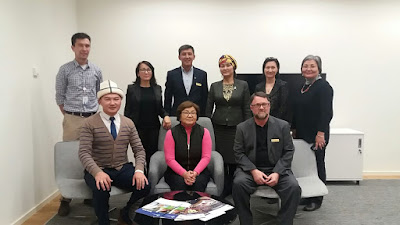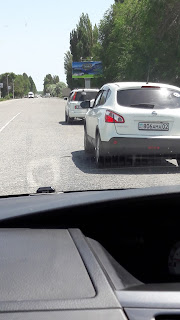I scanned my inbox and found a panoply of mildly troubling and slightly annoying messages to consider. But one was particularly jarring: the ex-President of Kyrgyzstan was arriving at our campus later, that very afternoon, with no prior warning. Ordinarily, such news wouldn't concern me a bit as I am usually able to blend into the background when dignitaries visit, except at that moment I realized the two administrators on campus with a higher rank than me were both out of town and would not be present for all the hoopla. That meant I would be the one to have to hang out with the ex-President. And even worse, as a person who keenly dislikes formality, I would have to wear my suit.
For those of you unfamiliar with matters Kyrgyz, this was no ordinary ex-President of Kyrgyzstan who was planning a visit, it was Roza Otunbayeva. President Otunbayeva started her career as a leader in Soviet Kyrgyzstan, educated in Moscow, speaker of five languages. After the fall of communism, she became a pioneering figure in the infant Kyrgyz nation. Otunbayeva was Kyrgyzstan's first ambassador to Canada and to the United States. She later served served as foreign minister and then as Ambassador to the United Kingdom. In 2010, Kyrgyzstan spiraled into chaos and revolution against a corrupt regime. Otunbayeva was one of the leaders of the democratic movement and was chosen to be President as Kyrgyzstan recovered from its instability and transitioned toward a more reformed government. Otunbayeva is the first woman president in Kyrgyz history as well as the only woman to ever lead any of the nations of Central Asia. In 2011, Secretary of State Hillary Clinton presented her with the International Women of Courage Award for her leadership especially in promoting women's rights. Since departing from office she has headed the Roza Otunbayeva Foundation which has created dozens of initiatives and projects designed to further Kyrgyzstan's social, political, and economic development. In other words, this was the Kyrgyz equivalent of having to host Jimmy Carter or Bill Clinton.
Madame President arrived on campus late in the afternoon and I was required to accompany her on a campus tour. Then she spoke extensively to our student body, particularly about her foundation's initiatives. Finally, I had to host a small, hastily arranged, dinner in her honor. This was the most troubling aspect of my duties. I am an American in my eating habits, which means that anything not readily consumed with one's hands--like pizza, hamburgers, and peanut butter and jelly sandwiches--presents the potential for social disaster, especially when in the company of former heads of state. After all, the last time I shared a meal on campus with an even slightly prominent outsider, His Highness the Aga Khan's personal photographer, I ended up spilling a half a plate of rice and stew down the front of my shirt. Please don't ask me how I managed to accomplish that great feat of skill. I would be lying if I didn't admit that visions of me chatting with Roza Otunbayeva with a bowl of soup splattered across my suit had been bothering me throughout the entire day.
The average person only meets an extremely small number of prominent people in their lifetime. And an even smaller subset of these dignitaries live up to the expectation you have for them. President Otunbayeva was certainly one of the members of this minuscule subset. Her encyclopedic knowledge of world affairs, her vivid descriptions of various world leaders, and her overall gracious and down-to-earth demeanor made dinner a pleasant and enjoyable event. And then it happened: President Roza Otunbayeva asked me who I would be voting for in the U.S. Presidential election.
Anyone who knows me well realizes that asking me that question is like waving a red cape in front of an angry bull, whacking a hornet's nest with a baseball bat, or wearing a Boston Red Sox cap into Yankee Stadium. This seemingly innocent question had the potential of being more embarrassing for me than if I had spilled an entire ten-liter bucket of chili on myself in front of the Presidential dinner party.
Somehow, though, I managed to take a deep breath and provided a calm and rational explanation for my vote. Fortunately, all in the room agreed that the thin-skinned, xenophobe I opposed would be an unmitigated disaster, not only for the United States, but for the entire world. Funny how virtually every human being I have encountered outside the U.S. with an ounce of education and a half a brain is in complete agreement on this point.
This final minefield avoided, we concluded our evening, the President departed, and our campus returned to normality. Best of all, my soup stayed out of my lap and my encounter with an amazing Kyrgyz leader entered my memory forever.
 |
| Seated next to President Otunbayeva after dinner |


























